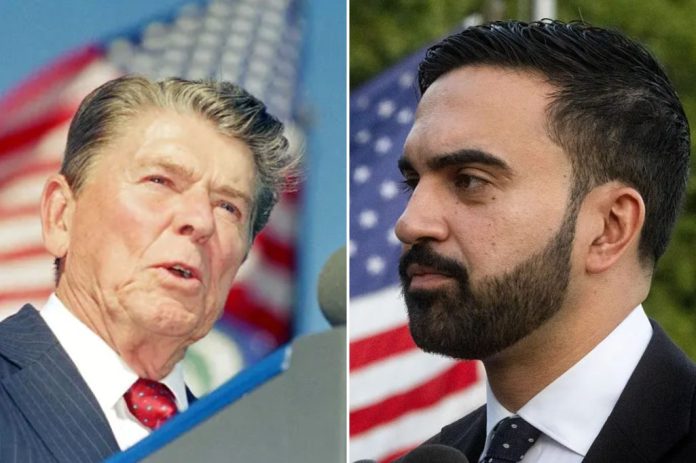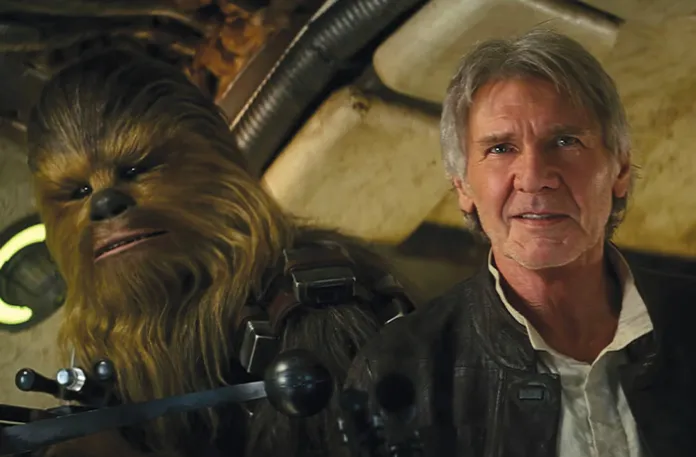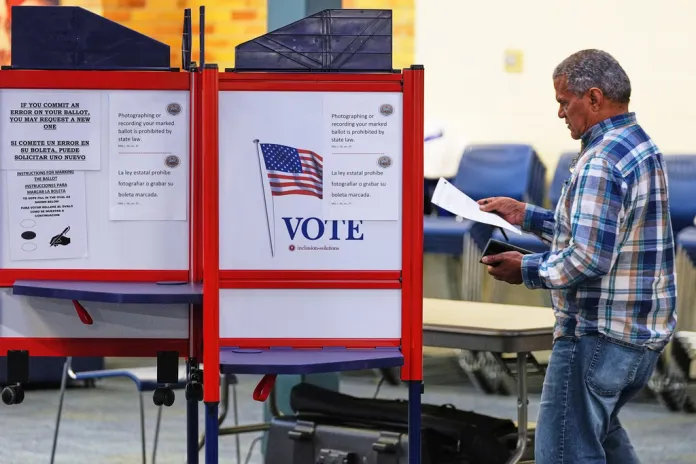Why Harris’s risk-free campaign is actually a huge risk – Washington Examiner
The article discusses Vice President Kamala Harris’s cautious approach as she campaigns for the presidency, noting that while she has avoided major blunders, this risk-averse strategy could be detrimental. Since becoming the Democratic nominee, Harris has primarily engaged in scheduled speeches and controlled appearances, leaving voters with limited insight into her platform and personality. Political analysts point out that this could backfire, especially considering her opponent, Donald Trump, employs a more unfiltered and spontaneous style that resonates with voters.
Despite a strong debate performance that drew positive feedback, Harris is criticized for not effectively countering the skepticism surrounding her administration’s credibility, which is associated with President Biden’s unpopularity. Her reluctance to engage with the media and frequent scripted appearances have contributed to a familiarity deficit with voters, who feel they know Trump better than they do her.
As the campaign progresses, Harris’s correlation to the Biden administration’s policies complicates her attempts to carve out a distinct identity. Her economic proposals, seen as incremental, fail to meet the urgency many voters feel regarding economic issues. Consequently, while Harris attempts to contrast herself with Trump, her campaign strategy may result in lost opportunities to connect with voters before the election, putting her candidacy at risk.
Why Harris’s risk-free campaign is actually a huge risk
Vice President Kamala Harris has managed to arrive at the final stretch of the presidential race without making a meaningful mistake. However, the risk-averse strategy that got her here could end up costing her campaign far more dearly than any gaffe could.
Aside from just one solo interview so far, a joint interview with running mate Gov. Tim Walz (D-MN), and her appearance in the first presidential debate on Tuesday, Harris has stayed safely behind the protective film of scripted speeches, tightly controlled campaign trail stops, and glossy social media videos in the roughly six weeks since becoming the Democratic nominee.
That’s left voters with little sense of Harris’s platform or personality. For an incumbent from a deeply unpopular administration, Harris risks allowing voters to fill in the blanks with their skepticism of her.
“It’s a calculated risk, but she really has no choice,” Mark Serrano, a former Trump campaign senior adviser, told the Washington Examiner. “She has to conceal her true self from independent voters, persuadable voters, low propensity voters. She has to conceal that.”
“She’s hiding from two things,” Serrano added. “One is her unrelatable persona, and two is her radical-left agenda.”
The vice president’s debate performance on Tuesday represented one of the first opportunities for the public to see how she would handle herself off a teleprompter, and political strategists and the media generally agreed she came away the victor.
“She had a huge Tuesday and, you know, hit it out of the park,” Jonathan Kott, a Democratic strategist, told the Washington Examiner. “That’s why she immediately said, ‘We’re ready for another debate.’”
But with no additional debate on the horizon — former President Donald Trump said this week he would not participate in another after crowning himself the winner of the ABC News debate on Tuesday — Harris may not have another set piece at which to attempt a race-shifting moment before voters cast their ballots. Short of creating her own major moment, Harris could stay trapped in a political dynamic that does not favor her candidacy.
The Trump contrast
Harris’s avoidant campaign style could prove all the more risky because of how sharply it contrasts with her opponent’s approach.
Were she running against a traditional politician, the vice president’s lack of spontaneity may not have become such a central part of the political narrative. Few, if any, presidential nominees have spent so much of their campaign speeches offering stream-of-consciousness reactions to the latest headlines or giving free-wheeling interviews across the media landscape, although Trump often does those things at his own expense.
Trump’s unfiltered public persona throws into even sharper relief Harris’s refusal to stray from a script. Her reluctance to answer calls that she hold a press conference or submit for more national media interviews has become a major storyline in itself, one that has at times threatened to eclipse the positive news her campaign has tried to generate.
By contrast, voters have gotten to know Trump quite well, whether they wanted to or not. In a New York Times-Siena College poll published this week, just 9% of voters said they needed to learn more about Trump compared to 28% who said the same about Harris.
Even some of Harris’s allies have acknowledged the danger of the familiarity deficit.
“But, before we begin to make plans for her inauguration, we must confront an important reality: the vast majority of the American people already know Donald Trump very well,” Sen. Bernie Sanders (I-VT) wrote in an op-ed on Thursday.
“It is important that the vice-president continues to define and expose Trump,” Sanders wrote. “But it may not be enough to secure a victory.”
With Trump’s views so thoroughly known to voters, Harris may be wasting what little time she has left by spending it on warnings about her opponent.
It’s a strategy that proved unsuccessful for the last woman to take on Trump in a presidential race.
“Hillary Clinton has decided it’s about time she do more talking about Hillary Clinton,” the Washington Post reported in September 2016, at an almost identical point in the race. “After a year and a half of running for president, the Democratic nominee has concluded that many Americans still do not have a clear understanding of what motivates her or what she would do as president. So in the campaign’s home stretch, Clinton is trying to reintroduce herself and her ideas to the country.”
The exhaustive analyses of why Hillary Clinton lost in 2016 to Trump included questions about whether she spent too much time trying to demonize Trump, who successfully claimed the mantle of the outsider promising change, and not enough time explaining to voters where she herself stood.
Harris has had a lot less time to explain herself to voters, and she has already used some of it to hammer Trump while he once again promises fundamental change.
“Donald Trump is the most vetted man in history,” Serrano said. “There’s absolutely nothing new we could ever learn about him that they would try to leverage against him.”
Burdened by Biden
Harris has so far struggled to shed the baggage of the unpopular Biden administration, despite her campaign’s efforts to create a fresh identity for her.
Virtually all of the walk-backs and flip-flops of her previous positions have come from written statements her aides give to reporters, not from Harris directly. The new policies she has proposed don’t depart meaningfully from the ones dragging down President Joe Biden’s approval ratings.
Polls show the economy is the most important issue to voters heading into Election Day, and many voters express unhappiness with the rising cost of living.
Harris’s economic proposals, such as a tax credit for first-time home buyers and an expanded tax deduction for startups, represent an incremental approach to a problem many voters see as worthy of a sweeping solution. For better or worse, Trump has pledged to shake up the status quo far more aggressively than Harris.
Harris’s debate performance, which received glowing praise from corporate media, may not have addressed her underlying weakness on that issue. Voters asked both before and after the debate who they trust more to handle the economy gave Trump an even greater advantage on the issue after the event, according to CNN’s instant poll of debate watchers on Tuesday.
Trump also maintained a 22-point lead after his debate performance on the question of who voters trust more to handle immigration, according to the same poll.
On the debate stage and in the one national media interview she’s given, Harris has done little to confront questions about how she would change the Biden-Harris administration’s stewardship of the economy or oversight of the border.
But her campaign has signaled she plans to continue avoiding the national media, saying this week that she will instead start doing more interviews with local press in swing states. She gave one of her first solo interviews since becoming the Democratic nominee to a local station in Philadelphia on Friday evening.
Kott, a former senior adviser to Sen. Joe Manchin (I-WV), said that approach is strategic because there’s no guarantee the audience for a cable interview will include the voters Harris needs to reach.
“When I worked for Joe Manchin and he was up for reelection, the first thing we did was stop doing national interviews, because they have no impact on your election,” he said.
Avoiding big interviews risks not just leaving in place the perception that Harris is no different than Biden on policy, but reinforcing the impression that she is similar to him in style as well. Biden spent the final weeks of his failed reelection bid participating only in local interviews, some of which involved the White House providing questions in advance.
But Harris’s campaign may have calculated that a poor performance in an adversarial interview, at this stage of the race, is an even bigger gamble.
“Her greatest adversary, and her staff’s greatest fear for her, is exposure,” Serrano said. “And I just don’t see them changing that strategy.”
" Conservative News Daily does not always share or support the views and opinions expressed here; they are just those of the writer."




